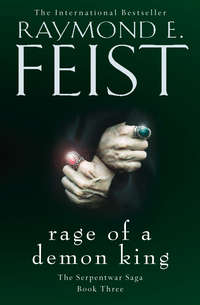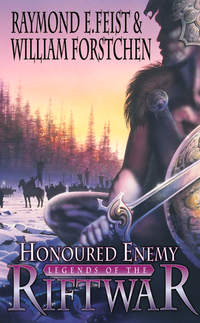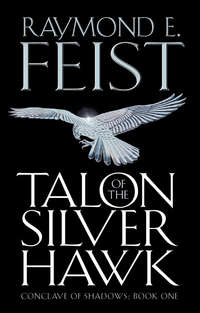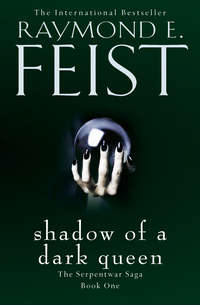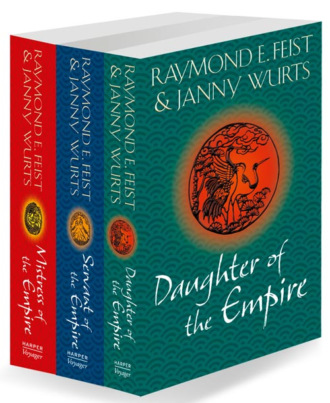
Полная версия
The Complete Empire Trilogy: Daughter of the Empire, Mistress of the Empire, Servant of the Empire
Exhausted, Mara settled back into the cushions. She must arise above grief to ponder. Her father’s most powerful enemy, Lord Jingu of the Minwanabi, had almost succeeded in gaining one of his life’s ambitions: the obliteration of the Acoma. The blood feud between the Acoma and Minwanabi had existed for generations, and while neither house had managed to gain the upper hand, from time to time one or the other had to struggle to protect itself. But now the Acoma had been gravely weakened, and the Minwanabi were at the height of their power, rivalling even the Warlord’s family in strength. Jingu was already served by vassals, first among them the Lord of the Kehotara, whose power equalled that of Mara’s father. And as the star of the Minwanabi rose higher, more would ally with him.
For a long while Mara lay behind the fluttering curtains, to all appearances asleep. Her situation was bitterly clear. All that remained between the Lord of the Minwanabi and his goal was herself, a young girl who had been but ten chimes from becoming a sister of Lashima. That realization left a taste in her mouth like ash. Now, if she were to survive long enough to regain family honour, she must consider her resources and plot and plan, and enter the Game of the Council; and somehow she must find a way to thwart the will of the Lord of one of the Five Great Families of the Empire of Tsuranuanni.
Mara blinked and forced herself awake. She had dozed fitfully while the litter travelled the busy streets of Kentosani, the Holy City, her mind seeking relief from the stress of the day. Now the litter rocked gently as it was lowered to the docks.
Mara peeked through the curtains, too numb to find pleasure in the bustle of the throngs upon the dockside. When she had first arrived in the Holy City, she had been enthralled by the multi-coloured diversity found in the crowd, with people from every corner of the Empire upon every hand. The simple sight of household barges from cities up and down the river Gagajin had delighted her. Bedecked with banners, they rocked at their moorings like proudly plumed birds amid the barnyard fowl as busy commercial barges and traders’ boats scurried about them. Everything, the sights, the sounds, the smells, had been so different from her father’s estates – her estates now, she corrected herself. Torn by that recognition, Mara hardly noticed the slaves who toiled in the glaring sun, their sweating, near-naked bodies dusted with grime as they loaded bundled goods aboard the river barges. This time she did not blush as she had when she had first passed this way in the company of the sisters of Lashima. Male nudity had been nothing new to her; as a child she had played near the soldiers’ commons while the men bathed and for years she had swum with her brother and friends in the lake above the needra meadow. But seeing naked men after she had renounced the world of flesh seemed somehow to have made a difference. Being commanded to look away by the attending sister of Lashima had made her want to peek all the more. That day she had to will herself not to stare at the lean, muscled bodies.
But today the bodies of the slaves failed to fascinate, as did the cries of the beggars who called down the blessings of the gods on any who chose to share a coin with the less fortunate. Mara ignored the rivermen, who sauntered by with the swaggering gait of those who spent their lives upon the water, secretly contemptuous of land dwellers, their voices loud and edged with rough humour. Everything seemed less colourful, less vivid, less captivating, as she looked through eyes suddenly older, less given to seeing with wonder and awe. Now every sunlit façade cast a dark shadow. And in those shadows enemies plotted.
Mara left her litter quickly. Despite the white robe of a novice of Lashima, she bore herself with the dignity expected of the Lady of the Acoma. She kept her eyes forward as she moved towards the barge that would take her downriver, to Sulan-Qu. Papewaio cleared a path for her, roughly shoving common workers aside. Other soldiers moved nearby, brightly coloured guardians who conducted their masters from the barges to the city. Keyoke kept a wary eye upon them as he hovered near Mara’s side while they crossed the dock.
As her officers ushered her up the gangplank, Mara wished for a dark, quiet place in which to confront her own sorrow. But the instant she set foot upon the deck, the barge master hustled to meet her. His short red and purple robe seemed jarringly bright after the sombre dress of the priests and sisters in the convent. Jade trinkets clinked on his wrists as he bowed obsequiously and offered his illustrious passenger the finest accommodation his humble barge permitted, a pile of cushions under a central canopy, hung round by gauzy curtains. Mara allowed the fawning to continue until she had been seated, courtesy requiring such lest the man unduly lose face. Once settled, she let silence inform the barge master his presence was no longer required. Finding an indifferent audience to his babble, the man let fall the thin curtain, leaving Mara a tiny bit of privacy at last. Keyoke and Papewaio sat opposite, while the household guards surrounded the canopy, their usual alertness underscored by a grim note of battle-ready tension.
Seeming to gaze at the swirling water, Mara said, ‘Keyoke, where is my father’s … my own barge? And my maids?’
The old warrior said, ‘The Acoma barge is at the dock in Sulan-Qu, my Lady. I judged a night encounter with soldiers of the Minwanabi or their allies less likely if we used a public barge. The chance of surviving witnesses might help discourage assault by enemies disguised as bandits. And should difficulty visit us, I feared your maids might prove a hindrance.’ Keyoke’s eyes scanned the docks while he spoke. ‘This craft will tie up at night with other barges, so we will never be upon the river alone.’
Mara nodded, letting her eyes close a long second. Softly she said, ‘Very well.’ She had wished for privacy, something impossible to find on this public barge, but Keyoke’s concerns were well founded.
Lord Jingu might sacrifice an entire company of soldiers to destroy the last of the Acoma, certain he could throw enough men at Mara’s guards to overwhelm them. But he would only do so if he could assure himself of success, then feign ignorance of the act before the other Lords of the High Council. Everyone who played the Game of the Council would deduce who had authored such slaughter, but the forms must always be observed. One escaped traveller, one Minwanabi guard recognized, one chance remark overheard by a poleman on a nearby barge, and Jingu would be undone. To have his part in such a venal ambush revealed publicly would lose him much prestige in the council, perhaps signalling to one of his ‘loyal’ allies that he was losing control. Then he could have as much to fear from his friends as from his enemies. Such was the nature of the Game of the Council. Keyoke’s choice of conveyance might prove as much a deterrent to treachery as a hundred more men-at-arms.
The barge master’s voice cut the air as he shouted for the slaves to cast off the dock lines. A thud and a bump, and suddenly the barge was moving, swinging away from the dock into the sluggish swirl of the current. Mara lay back, judging it acceptable now to outwardly relax. Slaves poled the barge along, their thin, sun-browned bodies moving in time, coordinated by a simple chant.
‘Keep her to the middle,’ sang out the tillerman.
‘Don’t hit the shore,’ answered the poleman.
The chant settled into a rhythm, and the tillerman began to add simple lyrics, all in tempo. ‘I know an ugly woman!’ he shouted.
‘Don’t hit the shore!’
‘Her tongue cuts like a knife!’
‘Don’t hit the shore!’
‘Got drunk one summer’s evening!’
‘Don’t hit the shore!’
‘And took her for my wife!’
The silly song soothed Mara and she let her thoughts drift. Her father had argued long and hotly against her taking vows. Now, when apologies were no longer possible, Mara bitterly regretted how close she had come to open defiance; her father had relented only because his love for his only daughter had been greater than his desire for a suitable political marriage. Their parting had been stormy. Lord Sezu of the Acoma could be like a harulth – the giant predator most feared by herdsmen and hunters – in full battle frenzy when facing his enemies, but he had never been able to deny his daughter, no matter how unreasonable her demands. While never as comfortable with her as he had been with her brother, still he had indulged her all her life, and only her nurse, Nacoya, had taken firm rein over her childhood.
Mara closed her eyes. The barge afforded a small measure of security, and she could now hide in the dark shelter of sleep; those outside the curtains of this tiny pavilion would only think her fleeing the boredom of a lengthy river journey. But rest proved elusive as memories returned of the brother she had loved like the breath in her lungs, Lanokota of the flashing dark eyes and ready smile for his adoring little sister. Lano who ran faster than the warriors in his father’s house, and who won in the summer games at Sulan-Qu three years in a row, a feat unmatched since. Lano always had time for Mara, even showing her how to wrestle – bringing down her nurse Nacoya’s wrath for involving a girl in such an unladylike pastime. And always Lano had a stupid joke – usually dirty – to tell his little sister to make her laugh and blush. Had she not chosen the contemplative life, Mara knew any suitor would have been measured against her brother … Lano, whose merry laughter would no more echo through the night as they sat in the hall sharing supper. Even their father, stern in all ways, would smile, unable to resist his son’s infectious humour. While Mara had respected and admired her father, she had loved her brother, and now grief came sweeping over her.
Mara forced her emotions back. This was not the place; she must not mourn until later. Turning to the practical, she said to Keyoke, ‘Were my father’s and brother’s bodies recovered?’
With a bitter note, Keyoke said, ‘No, my Lady, they were not.’
Mara bit her lip. There would be no ashes to inter in the sacred grove. Instead she must choose a relic of her father’s and brother’s, one favourite possession of each, to bury beside the sacred natami – the rock that contained the Acoma family’s soul – that their spirits could find their way back to Acoma ground, to find peace beside their ancestors until the Wheel of Life turned anew. Mara closed her eyes again, half from emotional fatigue, half to deny tears. Memories jarred her to consciousness as she unsuccessfully tried to rest. Then, after some hours, the rocking of the barge, the singing of the tillerman, and the answering chant of the slaves became familiar. Her mind and body fell into an answering rhythm and she relaxed. The warmth of the day and the quietness of the river at last conspired to lull Mara into a deep sleep.
The barge docked at Sulan-Qu under the topaz light of daybreak. Mist rose in coils off the river, while shops and stalls by the waterfront opened screened shutters in preparation for market. Keyoke acted swiftly to disembark Mara’s litter while the streets were still free of the choking press of commerce; soon carts and porters, shoppers and beggars would throng the commercial boulevards. In scant minutes the slaves were ready. Still clad in the white robes of Lashima’s sisterhood – crumpled from six days’ use – Mara climbed wearily into her litter. She settled back against cushions stylized with her family’s symbol, the shatra bird, embroidered into the material, and realized how much she dreaded her return home. She could not imagine the airy spaces of the great house empty of Lano’s boisterous voice, or the floor mats in the study uncluttered with the scrolls left by her father when he wearied of reading reports. Mara smiled faintly, recalling her father’s distaste for business, despite the fact he was skilled at it. He preferred matters of warfare, the games, and politics, but she remembered his saying that everything required money, and commerce must never be neglected.
Mara allowed herself an almost audible sigh as the litter was hoisted. She wished the curtains provided more privacy as she endured the gazes of peasants and workers upon the streets at first light. From atop vegetable carts and behind booths where goods were being arrayed, they watched the great lady and her retinue sweep by. Worn from constantly guarding her appearance, Mara endured the jostling trip through streets that quickly became crowded. She lapsed into brooding, outwardly alert, but inwardly oblivious to the usually diverting panorama of the city.
Screens on the galleries overhead were withdrawn as merchants displayed wares above the buyers. When haggling ended, the agreed price was pulled up in baskets, then the goods lowered. Licensed prostitutes were still asleep, so every fifth or sixth gallery remained shuttered.
Mara smiled slightly, remembering the first time she had seen the ladies of the Reed Life. The prostitutes showed themselves upon the galleries as they had for generations, robes left in provocative disarray as they fanned themselves in the ever-present city heat. All the women had been beautiful, their faces painted with lovely colours and their hair bound up in regal style. Even the skimpy robes were of the costliest weave, with fine embroidery. Mara had voiced a six-year-old girl’s delight at the image. She had then announced to all within earshot that when she grew up she would be just like the ladies in the galleries. This was the only time in her life she had seen her father rendered speechless. Lano had teased her about the incident until the morning she left for the temple. Now his playful jibes would embarrass her no further.
Saddened nearly to tears, Mara turned from memory. She sought diversion outside her litter, where clever hawkers sold wares from wheelbarrows at corners, beggars accosted passersby with tales of misery, jugglers offered antics, and merchants presented rare, beautiful silk as they passed. But all failed to shield her mind from pain.
The market fell behind and they left the city. Beyond the walls of Sulan-Qu, cultivated fields stretched towards a line of bluish mountains on the horizon; the Kyamaka range was not so rugged or so high as the great High Wall to the north, but the valleys remained wild enough to shelter bandits and outlaws.
The road to Mara’s estates led through a swamp that resisted all attempts to drain it. Here her bearers muttered complaints as they were plagued by insects. A word from Keyoke brought silence.
Then the road passed through a stand of ngaggi trees, their large lower branches a green-blue canopy of shade. The travellers moved on into hillier lands, crossing over brightly painted bridges, as the streams that fed the swamp continually interrupted every road built by man. They came to a prayer gate, a brightly painted arch erected by some man of wealth as thanks to the gods for a blessing granted. As they passed under the arch, each traveller generated a silent prayer of thanks and received a small blessing in return. And as the prayer arch fell behind, Mara considered she would need all the grace the gods were willing to grant in the days to come, if the Acoma were to survive.
The party left the highway, turning towards their final destination. Shatra birds foraged in the thyza paddies, eating insects and grubs, stooped over like old men. Because the flocks helped ensure a good harvest, the silly-looking creatures were considered a sign of good luck. So the Acoma had counted them, making the shatra symbol the centrepiece of their house crest. Mara found no humour in the familiar sight of the shatra birds, with their stilt legs and ever-moving pointed ears, finding instead deep apprehension, for the birds and workers signalled she had reached Acoma lands.
The bearers picked up stride. Oh, how Mara wished they would slacken pace, or turn around and carry her elsewhere. But her arrival had been noticed by the workers who gathered faggots in the woodlands between the fields and the meadow near the great house. Some shouted or waved as they walked stooped under bundles of wood loaded on their backs and secured with a strap across their foreheads. There was a warmth in their greeting, and despite the cause of her return they deserved more than aloofness from their new mistress.
Mara pulled herself erect, smiling slightly and nodding. Around her spread her estates, last seen with the expectation she would never return. The hedges, the trimmed fields, and the neat outbuildings that housed the workers were unchanged. But then, she thought, her absence had been less than a year.
The litter passed the needra meadows. The midday air was rent by the herds’ plaintive lowing and the ‘hut-huthut’ cry of the herdsmen as they waved goading sticks and moved the animals towards the pens where they would be examined for parasites. Mara regarded the cows as they grazed, the sun making their grey hides look tawny. A few lifted blunt snouts as stocky bull calves feinted charges, then scampered away on six stumpy legs to shelter behind their mothers. To Mara it seemed some asked when Lano would return to play his wild tricks on the ill-tempered breeding bulls. The pain of her losses increased the closer she came to home. Mara put on a brave face as the litter bearers turned along the wide, tree-lined lane that led to the heart of the estate.
Ahead lay the large central house, constructed of beams and paper-thin screens, slid back to open the interior to any breezes in the midday heat. Mara felt her breath catch. No dogs sprawled among the akasi flowers, tongues lolling and tails wagging as they waited for the Lord of the Acoma to return. In his absence they were always kennelled; now that absence was permanent. Yet home, desolate and empty though it seemed without the presence of loved ones, meant privacy. Soon Mara could retire to the sacred grove and loose the sorrow she had pent up through seven weary days.
As the litter and retinue passed a barracks house, the soldiers of her home garrison fell into formation along her line of travel. Their armour was polished, their weapons and trappings faultlessly neat, yet beside Keyoke’s and Papewaio’s, only one other officer’s plume was in evidence. Mara felt a chill stab at her heart and glanced at Keyoke. ‘Why so few warriors, Force Commander? Where are the others?’
Keyoke kept his eyes forward, ignoring the dust that clung to his lacquered armour and the sweat that dripped beneath his helm. Stiffly he said, ‘Those who were capable returned, Lady.’
Mara closed her eyes, unable to disguise her shock. Keyoke’s simple statement indicated that almost two thousand soldiers had died beside her father and brother. Many of them had been retainers with years of faithful service, some having stood guard at Mara’s crib side. Most had followed fathers and grandfathers into Acoma service.
Numbed and speechless, Mara counted those soldiers standing in formation and added their numbers to those who had travelled as bodyguards. Thirty-seven warriors remained in her service, a pitiful fraction of the garrison her father had once commanded. Of the twenty-five hundred warriors to wear Acoma green, five hundred were dedicated to guarding outlying Acoma holdings in distant cities and provinces. Three hundred had already been lost beyond the rift in the war against the barbarians before this last campaign. Now, where two thousand soldiers had served at the height of Acoma power, the heart of the estate was protected by fewer than fifty men. Mara shook her head in sorrow. Many women besides herself mourned losses beyond the rift. Despair filled her heart as she realized the Acoma forces were too few to withstand any assault, even an attack by bandits, should a bold band raid from the mountains. But Mara also knew why Keyoke had placed the estate at risk to bring such a large portion – twenty-four out of thirty-seven – of the surviving warriors to guard her. Any spies of the Minwanabi must not be allowed to discover just how weak the Acoma were. Hopelessness settled over her like a smothering blanket.
‘Why didn’t you tell me sooner, Keyoke?’ But only silence answered. By that Mara knew. Her faithful Force Commander had feared that such news might break her if delivered all at once. And that could not be permitted. Too many Acoma soldiers had died for her to simply give up to despair. If hopelessness overwhelmed her, their sacrifice in the name of Acoma honour became a mockery, their death a waste. Thrust headlong into the Game of the Council, Mara needed every shred of wit and cunning she possessed to avoid the snares of intrigue that lay in wait for her inexperienced feet. The treachery visited upon her house would not end until, unschooled and alone, she had defeated the Lord of the Minwanabi and his minions.
The slaves halted in the dooryard. Mara drew a shaking breath. Head high, she forced herself to step from the litter and enter the scrolled arches of the portico that lined the perimeter of the house. Mara waited while Keyoke dismissed the litter and gave the orders to her escort. Then, as the last soldier saluted, she turned and met the bow of the hadonra, her estate manager. The man was new to his post, his squint-eyed countenance unfamiliar to Mara. But beside him stood the tiny, wizened presence of Nacoya, the nurse who had raised Mara from childhood. Other servants waited beyond.
The impact of the change struck Mara once again. For the first time in her life, she could not fly into the comfort of the ancient woman’s arms. As Lady of the Acoma, she must nod formally and walk past, leaving Nacoya and the hadonra to follow her up the wooden steps into the shady dimness of the great house. Today she must bear up and pretend not to notice the painful reflection of her own sorrow in Nacoya’s eyes. Mara bit her lip slightly, then stopped herself. That nervous habit had brought Nacoya’s scolding on many occasions. Instead the girl took a breath, and entered the house of her father. The missing echoes of his footfalls upon the polished wooden floor filled her with loneliness.
‘Lady?’
Mara halted, clenched hands hidden in the crumpled white of her robe. ‘What is it?’
The hadonra spoke again. ‘Welcome home, my Lady,’ he added in formal greeting. ‘I am Jican, Lady.’
Softly Mara said, ‘What has become of Sotamu?’
Jican glanced down. ‘He wasted in grief, my Lady, following his Lord into death.’
Mara could only nod once and resume her progress to her quarters. She was not surprised to learn that the old hadonra had refused to eat or drink after Lord Sezu’s death. Since he was an elderly man, it must have taken only a few days for him to die. Absently she wondered who had presumed to appoint Jican hadonra in his stead. As she turned to follow one of the large halls that flanked a central garden, Nacoya said, ‘My Lady, your quarters are across the garden.’
Mara barely managed another nod. Her personal belongings would have been moved to her father’s suite, the largest in the building.
She moved woodenly, passing the length of the square garden that stood at the heart of every Tsurani great house. The carved wooden grille work that enclosed the balcony walkways above, the flower beds, and the fountain under the trees in the courtyard seemed both familiar and inescapably strange after the stone architecture of the temples. Mara continued until she stood before the door to her father’s quarters. Painted upon the screen was a battle scene, a legendary struggle won by the Acoma over another, long-forgotten, enemy. The hadonra, Jican, slid aside the door.
Mara faltered a moment. The jolt of seeing her own belongings in her father’s room nearly overcame her control, as if this room itself had somehow betrayed her. And with that odd distress came the memory: the last time she had stepped over this threshold had been on the night she argued with her father. Though she was usually an even-tempered and obedient child, that one time her temper had matched his.
Mara moved woodenly forward. She stepped onto the slightly raised dais, sank down onto the cushions, and waved away the maids who waited upon her needs. Keyoke, Nacoya, and Jican then entered and bowed formally before her. Papewaio remained at the door, guarding the entrance from the garden.


